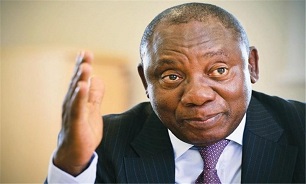South Africa's ANC Wins Re-Election with Reduced Majority
 Saturday's win assured a sixth straight term in power for the ANC. But the result was the worst-ever electoral showing for the party, which has ruled South Africa since the end of apartheid 25 years ago.
Saturday's win assured a sixth straight term in power for the ANC. But the result was the worst-ever electoral showing for the party, which has ruled South Africa since the end of apartheid 25 years ago.
Support for the ANC, which gained 62 percent in the previous election in 2014, has steadily declined since it took a record 69 percent of the vote in 2004. Saturday's electoral showing comes amid growing voter frustration over rampant corruption and high rates of unemployment.
President Cyril Ramaphosa, who replaced scandal-plagued Jacob Zuma last year, now faces the challenge of regaining public confidence in a party that remains beset with internal divisions and which oversaw a raft of economic crises in the country.
The result, which gives the ANC 230 seats in the 400-member parliament, will renew pressure on Ramaphosa to decisively deal with cabinet ministers accused of corruption.
In a victory speech in the northern city of Pretoria, Ramaphosa said the election confirmed "freedom and democracy reign" in South Africa.
"Our people have given all of the leaders of our country a firm mandate to build a better South Africa for all."
Earlier in the day, Jessie Duarte, ANC deputy secretary-general, struck a more sombre tone, saying the party would move swiftly to counter corruption and increase economic growth.
"We need to correct our mistakes," she said, adding that the election showed voters want an "ANC that is united, and in its unity remains true to the values and principles on which it was founded."
George Mthembu, who voted for the ANC, said he cast his ballot for his children.
"I know what my vote means," the unemployed resident of Johannesburg said.
"Even if we are unhappy with the way things are now, I remember where we came from during apartheid," he said referring to the decades of white-minority rule in South Africa.
But Marks Qhapelani, a taxi driver from Orange Grove in Johannesburg who cast his ballot for the opposition Democratic Alliance (DA), said he wanted change.
"I always voted ANC, but I had to vote for something different, because nothing is going to change with the ANC in power," he said.
"You only see the ANC for elections, then we'll have nothing from them for the next five years."
The DA won 20.77 percent of the vote, a two-percent dip from 2014. However, it maintained its grip on the Western Cape Province, which includes the city of Cape Town.
On Friday, Mmusi Maimane, the DA leader, said he was confident the party will continue to grow and do well in future votes.
"Give us until 2021 and 2024. We can demonstrate that we can hold all South Africans together," he said.
The results also showed significant gains for the far-left Economic Freedom Fighters (EFF), which, with almost 11 percent of the vote, polled about five percentage points higher than in its first election in 2014. The EFF is now the official opposition in three out of South Africa's nine provinces.
On the other side of the political spectrum, there were notable advances for the right-wing Freedom Front Plus, which took 10 seats in the parliament, up from four in the previous election.
Despite a number of interruptions and claims of electoral fraud and insufficient ballot papers at certain voting stations across the country, international and domestic election observers have endorsed the elections as free and fair.
Overall voter turnout stood at 65 percent, with more than half of eligible voters under 30 years of age failing to register to vote.
Among those who did not cast their votes was Lesego Sidebe, who lives in Johannesburg's Alexandra Township, where hundreds staged protests over crime and poor services in the lead up to the election.
"I'm 25 and nothing has changed. So why should I vote?" the unemployed young man said. "They call us born frees, but I don't feel free."
Sheila Meintjes, an associate professor of political studies at the University of Witwatersrand in Johannesburg, noted that the overall turnout was higher than in a number of recent elections in Western countries including the United States and the United Kingdom.
"This shows that we're still a country that is turned on by politics," she told Al Jazeera. But the decline for ANC "shows it cannot keep using its liberation credentials as an excuse," she added.
Tumi Jonas, a 32-year-old academic based in Cape Town, who voted for the radical Black First Land First, one of a number of new small parties on the ballot, said the election had "felt like an empty spectacle".
"This is my third time voting, and I've never felt so despondent about the whole thing. It's just going to be more of the same. I'm not feeling very hopeful about the future. I don't think our electoral system is really working for a lot of people," Jonas said.
Message end/
